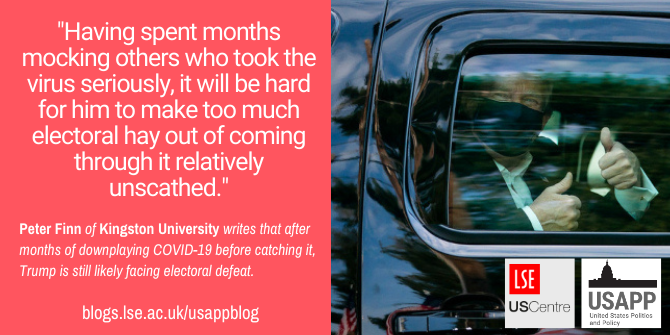 President Donald Trump immediately ceased campaigning following his COVID-19 diagnosis last week. Peter Finn argues that a quick recovery is unlikely to benefit Trump when he returns to the campaign, given his previous dismissive tone towards the pandemic, which included mocking his Democratic opponent, former Vice President Joe Biden, for wearing a mask at last week’s debate.
President Donald Trump immediately ceased campaigning following his COVID-19 diagnosis last week. Peter Finn argues that a quick recovery is unlikely to benefit Trump when he returns to the campaign, given his previous dismissive tone towards the pandemic, which included mocking his Democratic opponent, former Vice President Joe Biden, for wearing a mask at last week’s debate.
- This article is part of our Primary Primers series curated by Rob Ledger (Frankfurt Goethe University) and Peter Finn (Kingston University). Ahead of the 2020 election, this series explores key themes, ideas, concepts, procedures and events that shape, affect and define the US presidential primary process. If you are interested in contributing to the series contact Rob Ledger (ledger@em.uni-frankfurt.de) or Peter Finn (p.finn@kingston.ac.uk).
On October 2nd President Donald Trump and First Lady Melania Trump both tested positive for COVID-19. The president was hospitalised on October 3rd and released on October 5th. Upon his release Trump quickly told people ‘Don’t be afraid of’ the virus.
Trump’s positive test and hospitalisation came as the US continues to rack up grim COVID-19 related milestones. On September 22nd it passed 200,000 confirmed deaths (the largest in the world), passing 7 million confirmed cases on September 25th.
Mocking, Antagonism and Contrasting Campaigns
Trump’s positive diagnosis, and that of numerous others in his inner circle, came just days after Trump mocked his Democratic Party opponent Joe Biden for wearing a mask in a particularly unnerving presidential debate performance. Reflecting this, numerous members of Trump’s family seated in the auditorium did not wear masks during the debate.
Trump’s mocking of Biden reflects the broader antagonistic tone he has utilised in his response to COVID-19. As I documented in a recent report on COVID-19 and democracy, Trump initially dismissed the virus. Yet, after the World Health Organization declared a pandemic in mid-March, Trump said ‘I’ve always known […] this is a pandemic.’
On April 23 Trump questioned whether injecting ultraviolet light or disinfectant could be used to treat COVID-19. He later claimed he was being sarcastic. However, medical professionals, elected officials, cleaning product manufacturers and the US Food and Drug Administration Commissioner all clarified that cleaning products should not be injected or ingested. Trump has also attacked the media, offered support to those protesting stay-at-home orders, used racist language to characterize COVID-19 and criticised the response of the US Centers for Disease Control and Prevention, which he oversees.
In early September, it emerged that in interviews with Washington Post reporter Bob Woodward Trump had publicly played down the risk of COVID-19 despite being aware of its seriousness. Telling Woodward on February 7th it was ‘deadly stuff’.
Throughout the spring and summer, by contrast, Biden has run an understated campaign, shifting from face-to-face campaigning to a mix of online speeches, meetings, gatherings, the use of social media and dabbling with a podcast. Together, these elements built towards a relatively successful, though mainly virtual, nominating convention for Biden, and his Vice Presidential pick Kamala Harris, in August.
Effects on Campaigning
Trump’s diagnosis will have important consequences for the remainder of the campaign. Trump clearly enjoys face-to-face campaigning, but will be unable to do so for at least two weeks. Biden’s campaign responded to events by halting negative ads about Trump. Though the Trump campaign did not do the same for ads attacking Biden.

“President Trump Greets Supporters” by The White House is Public Domain.
The next presidential debate with Biden is scheduled for October 15th in Florida, with a second in Tennessee in the calendar for the 22nd. Whether either of these occur as planned or rescheduled will depend on Trump’s health over the next few weeks. What does seem assured is that the Vice Presidential debate between Harris and Vice President Mike Pence in Utah this evening (Wednesday October 7th) has, at least until full clarity about Trump’s health moving forward is available, taken on much more significance than it would have previously (though given both Trump and Biden are in their mid-70s, it was always likely many would have paid close attention to the VP debate anyway).
Electoral Effect
Assuming he recovers relatively quickly, it is unlikely that Trump catching, and his hospitalization because of, COVID-19 will alter the election outcome significantly. Having spent months mocking others who took the virus seriously, it will be hard for him to make too much electoral hay out of coming through it relatively unscathed. Though one can envisage him using a speedy recovery as evidence that he was right all along, it is unclear how this would play with millions of voters who have been affected in a very real way by the virus.
According to polls Biden has a significant lead over Trump, with Trump’s main route back to the White House remaining an Electoral College victory, rather than winning the popular vote. Though it is not beyond the realm of possibility that Trump, recreating his 2016 defeat of Hillary Clinton, could sway voters in swing states. However, as Ronald Ranta has argued in this series, this appears an increasingly unlikely scenario.
Please read our comments policy before commenting.
Note: This article gives the views of the author, and not the position of USAPP– American Politics and Policy, nor of the London School of Economics.
Shortened URL for this post: https://bit.ly/3nryJpZ
About the author
 Peter Finn – Kingston University
Peter Finn – Kingston University
Dr Peter Finn is a multi-award-winning Senior Lecturer in Politics at Kingston University. His research interests include US elections, national security and impunity in the context of democratic states and democracy more broadly. He is Project Lead on the COVID-19 and Democracy project.






